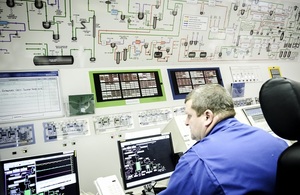Tēnā koutou, tēnā koutou, tēnā koutou katoa
(English translation: Greeting, greetings, greetings to you all)
Thank you to the British High Commission for organising this event.
My last physical, and absolutely brilliant visit to New Zealand, was in 2016 when I was Minister for Asia and the Pacific in our Foreign and Commonwealth Office.
On this occasion, it is a real pleasure to be joining you virtually.
As countries, peoples and friends we have so many shared interests and values.
One of the most important is our commitment to tackling climate change.
Last year, the UK and New Zealand became two of the first countries in the world to commit to reaching net zero by 2050.
We have worked together to drive climate action across the international community.
As members of the High Ambition Coalition, the Cartagena Dialogue, and the Carbon Neutrality Coalition.
We have shared ambition, expertise and innovation.
And at this critical moment in the fight against climate change, we want to build on this collaboration.
To create fairer, greener and more resilient economies at home and around the world.
Today, governments and businesses are, rightly, focussing on their response to the coronavirus pandemic.
But the climate crisis remains as acute as ever.
You know this all too well, as do we in the UK.
Earlier this year we both suffered severe floods.
New Zealand has also experienced droughts.
And many of our friends across the Pacific face a threat to their very existence.
The science is clear.
To limit warming to 1.5 degrees, we need to halve global emissions over the next decade.
However, current commitments made under the Paris Agreement fall far short of what is required.
That is why, as hosts of COP26, the UK wants to ramp up ambition to achieve a climate-resilient, zero-carbon economy.
We need all countries to submit more ambitious Nationally Determined Contributions (NDC), driving further cuts in carbon emissions by 2030.
And we need all nations to commit to reaching net zero as soon as possible.
The UK will submit its own ambitious NDC, to complement our net zero commitment, well ahead of the summit.
I welcome the fact that New Zealand’s NDC is being assessed by the Climate Change Commission in line with the 1.5 degree target.
And we hope the Commission’s advice will lead to a more ambitious NDC with strong targets across the whole economy.
In addition to raising ambition, the UK’s COP Presidency will focus efforts on 5 areas which need particular attention to achieve our goals.
These are: clean energy, clean transport, nature-based solutions, adaptation and resilience, and underpinning everything, finance.
Here in the UK, we are taking action in each of these areas.
In July – we announced a plan to invest the equivalent of over 5.5 billion New Zealand dollars into improving the energy efficiency of homes and public buildings in 2020/21.
Supporting green jobs, reducing emissions and cutting costs for householders.
When it comes to clean transport, since March we have committed almost NZ$2 billion in the transition to electric vehicles. With research funding, grants for consumers, and investment in infrastructure.
We are putting over NZ$1.2 billion towards protecting English habitats through projects such as tree planting, river clean-ups and creating new green spaces for people and wildlife.
And when it comes to adaptation and resilience at home, we have just announced our new long term plan to tackle flooding. We are investing NZ$10 billion in bolstering our own resilience through flood and coastal defences. Providing better flood protection for 336,000 properties by 2027.
And on finance, last year, the UK committed to doubling its international climate finance contribution to NZ$22 billion over the period 2021 to 2025.
I know that New Zealand is taking action too, with measures like the environmental jobs package, and your investment in conservation and biodiversity.
I very much want New Zealand and the UK to continue to work closely, to encourage countries around the world to go further.
And to work together across the Pacific.
As a trusted partner of many states, your support in the region will be invaluable.
However, it is not only governments that have a part to play ahead of COP26.
Businesses also have a very important role.
It is fantastic to see that over 100 Chief Executives in New Zealand have already made pledges on reporting and reducing emissions through the Climate Leaders Coalition.
I want to urge all businesses to join the Race to Zero Coalition.
This initiative launched by the High Level Champions for COP25 and COP26 in June is the largest ever alliance of businesses and non-state actors committed to reaching net zero by 2050 at the latest.
We are also working with young people and Indigenous Peoples to shape our response to the climate crisis.
This is particularly important here in New Zealand, where there is much to learn from Māori knowledge and practice about our relationship with the natural world.
Ladies and gentlemen. Whether we live in the South, the North, the East or the West, we share one life-giving but incredibly fragile planet.
So it is imperative that we work together, in the aftermath of the coronavirus, and ahead of COP26, to build back better.
Ka nui te mihi (Te reo Māori, English translation: Thank you very much.)

